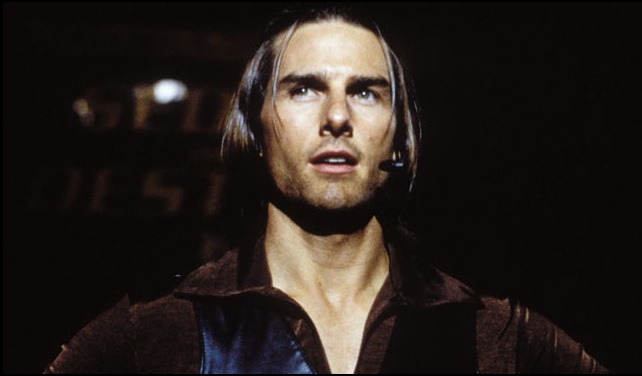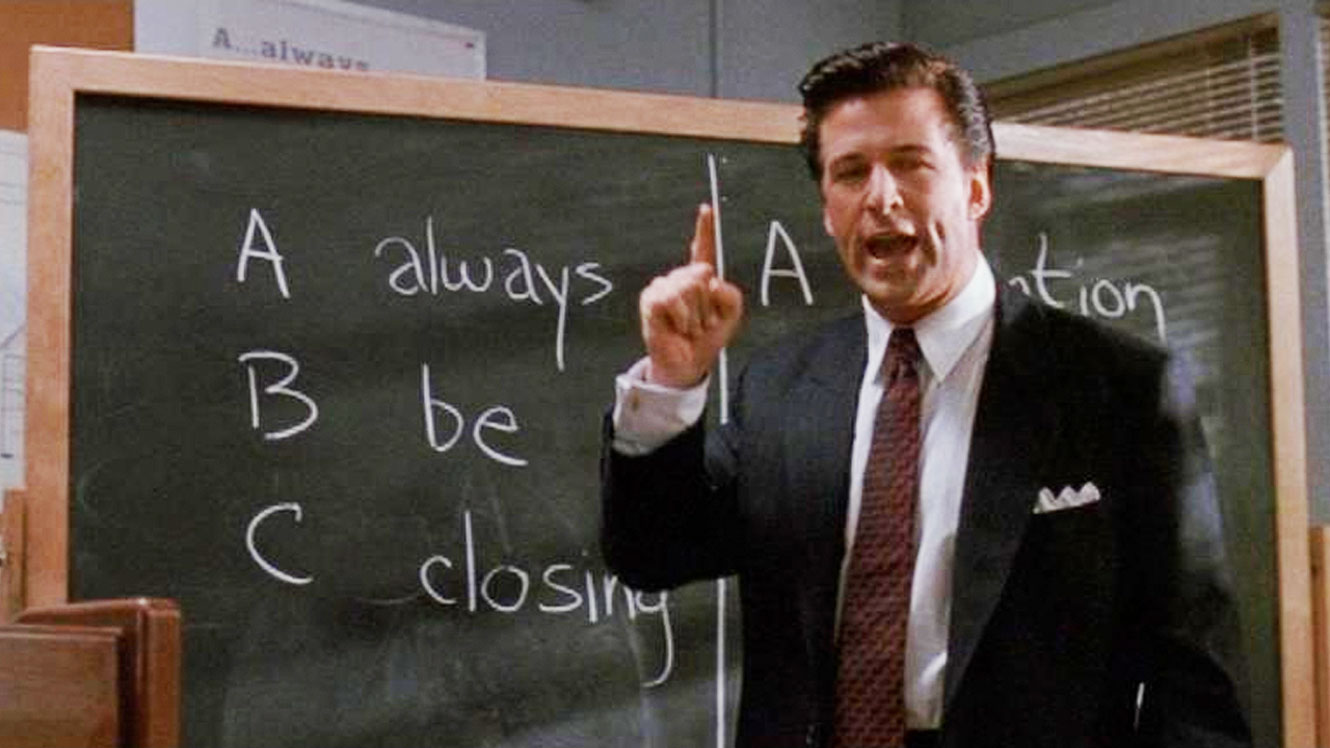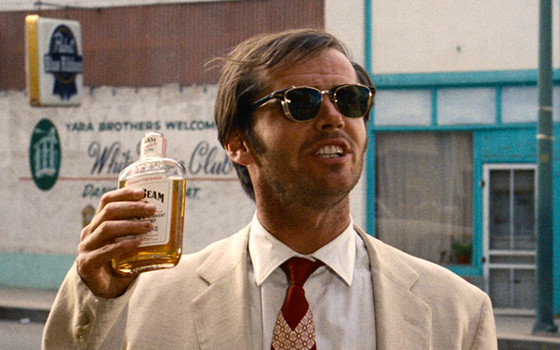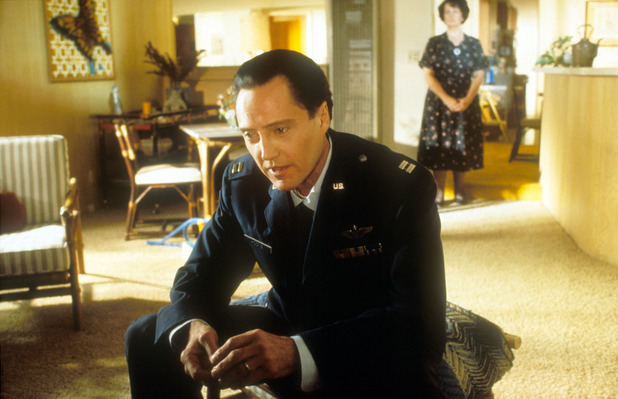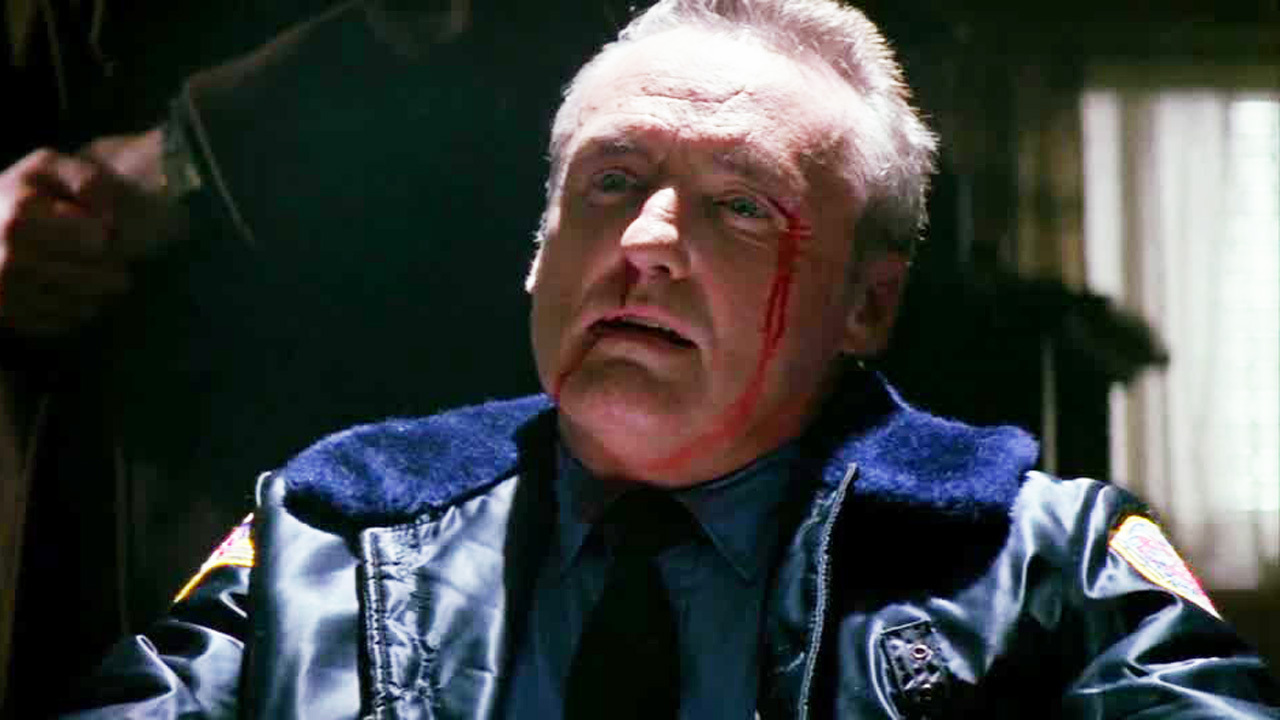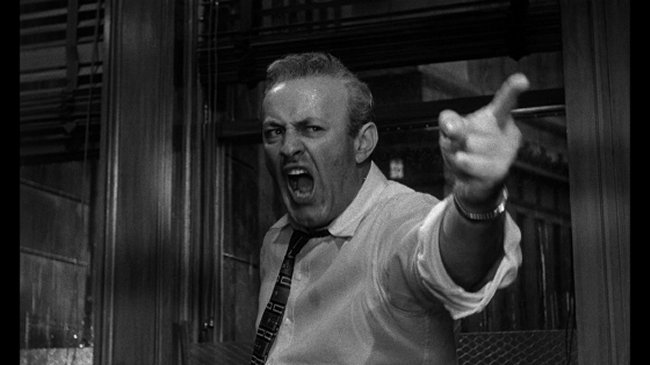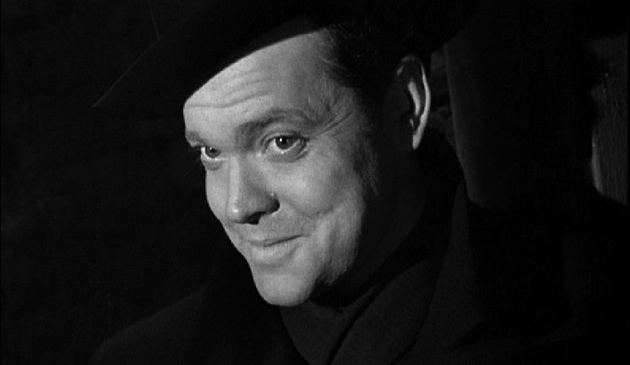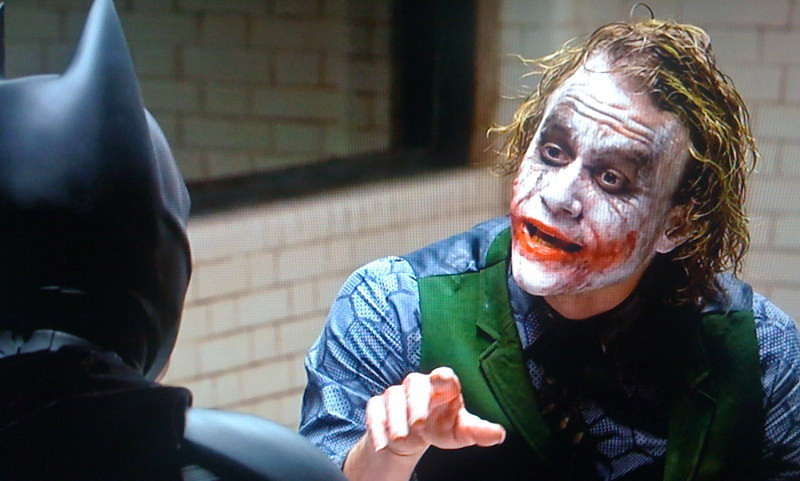8. Tom Cruise in Magnolia (1999)
Tom Cruise surely planned for 1999 to be a big year in his career since Eyes Wide Shut, director Stanley Kubrick’s last film, was to finally be released. The unhappy fate of that film is well known. Cruise really pulled his bruised career out of the fire in a most unexpected way. He accepted, at way less than his usual fee, a rather small part in a film from acclaimed indie film maker Paul Thomas Anderson entitled Magnolia.
The film was much like Short Cuts in that it told multiple stories set around the same area of southern California (and also included Julianne Moore, and Phillip Seymour Hoffman in the cast). Cruise played a role unlike any he has ever played before or since, a slick, manipulative, misogynistic guru of a windy self help movement who has some major family issues going on (not unlike those in the actor’s own life). He redeemed years of plastic performances with by far the most honest work he has ever done on screen.
7. Alec Baldwin in Glengarry Glen Ross (1992)
Alec Baldwin is a character actor trapped in the body of a leading man. Though he had leading man looks there’s something aggressive and confrontational about him that caused him to never quite make star status in the movies. He knows enough to go with a good role, whatever the size, and has the talent to pull it off. Supreme proof of this is his one-scene part in Glengarry Glen Ross.
At the start of the film, his corporate higher up comes to call on a meeting of salesmen in the real estate firm that is the setting for the film. He sets things in motion by telling the men that there will be a selling contest that month and that first prize is a nice trip, second a set of steak knives and third, pink slips. Given Baldwin’s fierce, dynamic, no-holds-barred performance, the salesmen and the viewer know that he’s not kidding. Glengarry Glen Ross is an acting-lover’s dream with several Oscar winners and nominees in the cast (though only Al Pacino was actually nominated for the film itself). However, for five minutes that film belongs to Alec Baldwin alone.
6. Jack Nicholson in Easy Rider (1969)
If there is one actor who set the screen on fire in the New Hollywood era in the way that Brando did in the post World War II era, it’s Jack Nicholson. Unlike Brando, Nicholson didn’t exactly set the woods on fire when he began in films (with the cult classic Little Shop of Horrors in 1960, though he wasn’t noticed at the time).
In fact, he spent one pretty forgettable decade before fortune smiled on him. He had been making low budget, forgettable films (mostly for American International Pictures) and doing TV when he was approached by actor-director-writer Dennis Hopper and co-star and writer Peter Fonda for an independent production they were making about the hippie and motorcycle culture of the time. They wanted him, not to play a hippie or biker, but a liberal lawyer, the scion of a wealthy family gone to alcoholic seed.
The role was to have been played by stage actor Rip Torn but the contentious Torn and the contentious Hopper weren’t about to co-exist, much less work together. Nothing was expected of the film but the stars were aligned just right and the film, not great, but gritty, touched a nerve with the younger audiences of the time.
It was a real game-changing hit for Hollywood. Not the least of the factors in the film’s success was the superb ten minute or so performance Nicholson gave in the middle of the film (and the film looses a lot when his character is dispatched). He won his first Oscar nomination (the most prominent one the film received). This set the stage for his starring performance in Five Easy Pieces the next year and he was on his way to immortality.
5. Christopher Walken in Pulp Fiction (1994)
Christopher Walken is, well, an interesting actor. He’s very talented, not only in acting but song and dance. However, with his large, scary eyes and angular, hollow face he is one unnerving presence. He has had a few leads in his film career but he and film makers have been sensible enough to know that this actor would be best for a few unforgettable minutes in one film after another.
One of his best small roles and best films came with director-writer Quentin Tarrantino’s legendary breakthrough film Pulp Fiction. The film, consisting of three interrelated stories, is an ensemble affair. Episode two, involving a prize fighter double crossing the mob, opens with a scene that flashes back to the main character’s boyhood. In the scene a man has come to visit the boy.
It is his late father’s commanding officer and fellow POW in Vietnam (Walken). He has come bearing a gift: a watch the father hid from their captors at great personal cost. The officer talks to the boy not as a grown up to a child but as one man to another, albeit a very young one, and impress on him the fact that he is being given a sacred artifact. This supremely played scene supplies the emotional heft for that episode, for without it the episode wouldn’t quite make sense and the linchpin of that scene is Christopher Walken.
4. Dennis Hopper in True Romance (1993)
Christopher Walken met his scene-stealing match on screen just once to date and, coincidently, it was in a film Tarrantino scripted but wasn’t allowed to direct, True Romance. This was another crime related story. It featured a young couple on the run after they had double crossed the mob. Walken played a mob kingpin hot on the couple’s trail and his best plan is to torture the young man’s father into telling the couple’s whereabouts. The father, a philosophical trailer dweller who studies history, was portrayed by Dennis Hopper.
Hopper had already been on screen for many years. However, for many, many of them, he had been one drugged out mess. However, he cleaned up in the late1980s. Hoosiers and Blue Velvet in 1986 put him back in orbit. He showed what he could do in his one scene in True Romance. The character knows he’s doomed but he won’t betray his son. In talking with his future killer, an Italian-American, he relates in cheerfully derisive terms how his history studies have clued him in to the fact that Italians are a mixture of European peoples and Africans. The mob guy gives him a little kiss before killing him and deciding to find the son another way.
3. Lee J. Cobb in 12 Angry Men (1957)
Lee J. Cobb was a big, not conventionally handsome man who seemed to have been born middle-aged. He was a stage actor eternally known for playing Willie Loman in the original Broadway production of the classic “Death of a Salesman”. Too bad a plum such as that never fell to him in his film career. He spent his many years in film as a character actor and did win two Oscar nominations, one for the mob boss in 1954’s On The Waterfront and the other for playing one of classic literature’s worst fathers in 1958’s The Brothers Karamazov.
An even better role was in Sidney Lumet’s 12 Angry Men. The film is a study of characters under stress and group dynamics in the form of a jury of twelve men deciding if a boy from the slums is guilty of killing his father. All are quick to rush to a judgment of guilty save for one lone, sane, holdout (Henry Fonda) who thinks that there may be reasonable doubt. Slowly, one by one, the others come around to his way of thinking.
The last objector is a large, windy man who obviously has issues with his own son and he is truly one angry man. This role, perhaps better than any other, tapped into the anger and bitterness Cobb seemed to carry with him. It wasn’t a lead or huge but it was, perhaps, a plum-ette.
2. Orson Welles in The Third Man (1949)
Orson Welles was always larger than life, even before he literally became larger than most other things. He was almost always the star of his own films but rarely had lead roles in the films of others. He was never quite box office and he could steal any film from the box office stars simply by showing up. However, he did get a lot of work in films that needed a jolt in places.
Directors and producers who knew just the man to call in order to supply that jolt. Many, many of his appearances could be considered here but the champion of them all came in one of the cinema’s great pictures, certainly one of the best film noir/thrillers, director Carol Reed’s The Third Man.
The plot of the film takes place in bombed out post WWII Vienna. Hack American writer Holly Martins comes to the city at the invitation of boyhood friend Harry Lime. However, upon arrival it turns out Lime is dead, victim of a mysterious accident. It also turns out that he was a vicious racketeer, lately dealing with supplying fake penicillin to hospitals, with tragic results. It also turns out that Lime isn’t so dead after all. Lime is talked about for about half the film before he shows up, and then briefly.
Welles and Reed collaborated to give the character one of the great entrances in film history. Lime is on the run and is only seen fleetingly thereafter save for one big scene that Welles co-wrote and pulls off seamlessly. If Lime hadn’t lived up to advertisement the film would have gone flat. Welles was anything but flat and neither is the film.
1. Heath Ledger in The Dark Knight (2008)
What path might Heath Ledger’s career have taken if unfortunate circumstances hadn’t ended that career and his life? However, he did leave some promising work behind, notably the gay-themed favorite, Ang Li”s Brokeback Mountain (2005), and his last completed film, Christopher Nolan’s The Dark Knight.
This was the second film in Nolan’s serious reboot of the Batman saga after the slick, colorful, rubbish-y Batman films of the recent past. In this one, Batman (Christian Bale) goes up against the Joker (Ledger), who is a sight to behold. In the past, the character was portrayed as a crazy clown of crime. Here he is quite insane in a sociopathic way and his colorful make-up is more to cover the ugliness of what life has done to him and has made of him. Reportedly taking on the character had devastating consequences for the actor but it, at the very least, enriched his legacy and left him an Oscar winner (albeit posthumously).
Author Bio: Woodson Hughes is a long-time librarian and an even longer time student/fan of film,cinema and movies. He has supervised and been publicist for three different film socieities over the years. He is married to the lovely Natalie Holden-Hughes, his eternal inspiration and wife of nearly four years. You can visit his blog at Stream of Dreams.
